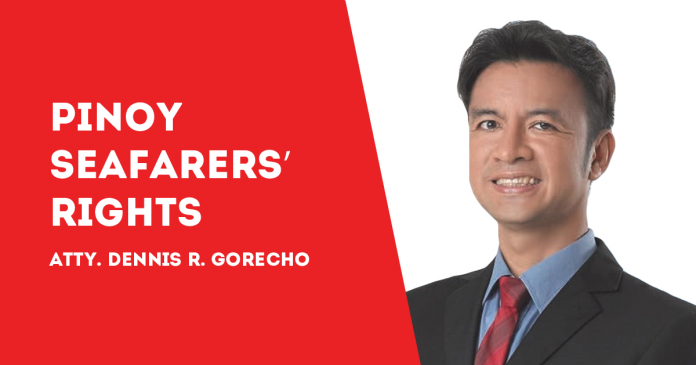
SEAFARERS have to brave storms and high waves during the vessel’s journey, and this could have a dramatic impact on the quality of their lives at sea.
The job entails laborious manual tasks conducted in a moving ship along with the sudden change of climate and temperature as the vessel crosses territories.
The Supreme Court recognizes that prolonged and continued exposure to the changes in temperatures could probably expose the seafarers to the risk of suffering from illnesses or accidents.
The seafarer is entitled to compensation for certain diseases through the aggravation principle wherein his work conditions caused or, at least, increased the risk of contracting the disease.
The Court noted that reasonable proof of work connection is sufficient – direct causal relation is not required. Thus, probability, not the ultimate degree of certainty, is the test of proof in compensation proceedings.
In Atienza vs OROPHIL Shipping Intl. (G.R. No. 191049, Aug. 7, 2017),the seafarer, an Able Seaman, was diagnosed to be suffering from right cavernous sinus inflammation or Tolosa Hunt Syndrome (THS). The Court considered said illness as compensable since he was called to keep watch at sea during navigation, and to observe and record weather and sea conditions, among others.
In the performance of his duties, the seafarer was constantly exposed to cold, heat, and other elements of nature.
While the exact cause of THS is unknown, the Supreme Court opined that the seafarer’s illness was most probably aggravated due to the peculiar nature of his work that required him to be on-call 24 hours a day toobserve and keep track of weather conditions and keep watch at sea during navigation.
These activities necessarily entail the use of eye muscles that can cause an eye strain as in fact, he experienced headache, nausea, and double vision that worsened when he looked at his right side.
Considering further his constant exposure to different temperatures and unpredictable weather conditions that accompanied his work on board an ocean-going vessel, the likelihood to suffer a viral infection – a possible risk factor – is not far from impossible.
In Grace Marine Shipping Corp. vs Alarcon (G.R. No. 201536, Sept. 9, 2015), the Supreme Court attributed the seafarer’s psoriasis to the stress and climate changes that permeate his working environment.
The Court also notedthat the seafarer used strong detergent, fabric conditioner, special soap and chemicals in performing his duties as a steward.
Despite the declaration in the medical reports that psoriasis is not contagious, the Court emphasized that no profit-minded employer will hire the seafarer considering the repulsive physical manifestation of the disease, its chronic nature, lack of long-term cure and the vulnerability of the patient to cardiovascular diseases and some cancers.
Its inevitable impact on the seafarer’s chances of being hired and capacity to continue working as a seafarer cannot be ignored, entitling him to permanent total disability benefits.
In Fil-Pride Shipping Company, Inc., et al. vs Balasta, (728 Phil. 297), the Supreme Court reiterated its ruling in several cases that cardiovascular disease, coronary artery disease, as well as other heart ailments were held to be compensable since the work of a seafarer is both physically and mentally stressful.
The Court pointed out that the seafarer was constantly exposed to harsh weather condition as well as to varying temperatures of extreme hot and cold as the ship crossed ocean boundaries.
In the performance of his duties as Able Seaman, he inhaled, was exposed to, and came into direct contact with various injurious and harmful chemicals, dust, fumes/ emissions, and other irritant agents.
The Court said these tasks could very well cause the illness that the seafarer, then already 47 years old, suffered from six months into his employment contract with company.
In Teodoro vs Teekay Shipping Phil. (G.R. No. 244721, Feb. 5, 2020), the Supreme Court considered the loss of vision of the cook’s left eye as attributable to the sudden extreme changes in temperature from the upper deck to the freezer during the hauling and storage process for the food provisions.
The panel of voluntary arbitrators pointed out that the seafarers were exposed to extreme temperatures without the proper protective clothing, thus, creating a more dangerous work environment that resulted to the seafarer’s permanent blindness in the left eye and his incapacity to resume the same line of work.
Being exposed to adverse climate conditions and other forces of nature at sea can be challenging but it is in these types of situations that Filipino mariners continue to thrive.
***
Atty. Dennis Gorecho heads the seafarers’ division of the Sapalo Velez Bundang Bulilan law offices. For comments, email info@sapalovelez.com, or call 09175025808 or 09088665786./PN


